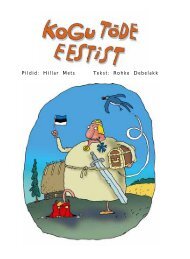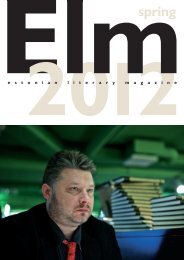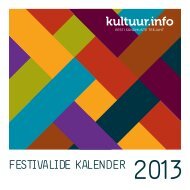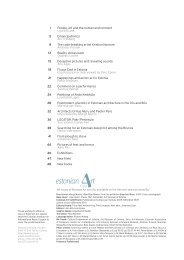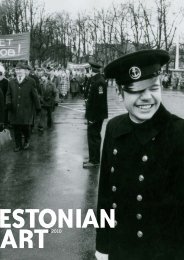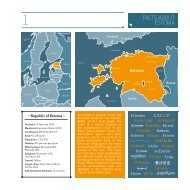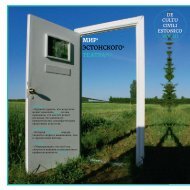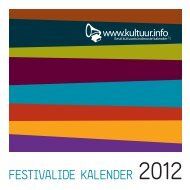Autumn 2013
Autumn 2013
Autumn 2013
Create successful ePaper yourself
Turn your PDF publications into a flip-book with our unique Google optimized e-Paper software.
Vadi<br />
5<br />
the closet). From then on, he published short<br />
stories, novels and plays. Ten excellent<br />
books for such a relatively young man is<br />
quite an achievement.<br />
Vadi’s texts are fluent and seem to have<br />
been written down in the easy rhythm of<br />
breathing in and out. There is, however,<br />
detailed preparation. For plays and longer<br />
prose texts, Urmas produces graphs, noting<br />
down the main events, plot lines, and how<br />
the main characters move and change. This<br />
provides a structure and composition to<br />
return to if something seems wrong. Nothing<br />
flippant then: writing is hard work.<br />
How did it happen that a perfectly nice<br />
young man became a writer? Vadi says he<br />
began writing in secondary school. The 8 th<br />
Secondary School in Tartu was rather<br />
exceptional: it had a special class of<br />
literature that included creative writing.<br />
Urmas regarded himself as a writer even<br />
back then, although he now finds it idiotic to<br />
be a writer if you see yourself as one.<br />
For his readers, it is certainly no longer<br />
an issue whether he is a writer or not. Urmas<br />
has no need to prove himself, but if he really<br />
has to introduce himself to someone he<br />
might confess to being a writer.<br />
It can be pretty embarrassing to be<br />
introduced as a writer, and a well-known one<br />
at that. Urmas once went to a wedding<br />
reception and was introduced to the bride’s<br />
mother as “the famous writer Urmas Vadi”.<br />
The poor mother seemed to frantically<br />
search her memory, but the name of the<br />
“famous writer” clearly did not ring a bell. It<br />
happens.<br />
Having started with short stories and<br />
published novels, he now mostly writes<br />
plays, which have been staged in Estonian<br />
theatres since 2001. Some are reflective,<br />
and some more humorous. Urmas is still<br />
fond of writing short stories and has, in fact,<br />
recently given up plays for a while and is<br />
planning to write a number of stories. He<br />
thus keeps the genres apart, as they really<br />
are quite different, starting with the plot<br />
structure.<br />
In the past few years he has produced a<br />
number of his plays himself. This has<br />
nothing to do with being suspicious of other<br />
directors; he just assumes that he knows the<br />
theatrical language in which his texts can<br />
work best.<br />
The good thing about producing your<br />
own plays, according to Vadi, is that he<br />
writes almost all his plays shortly before<br />
directing them, thinking about a specific<br />
venue or actors. Some examples: The Last<br />
Kiss of Peeter Volkonski and Rein Pakk Is<br />
Looking for a Woman. The lead in the first<br />
was naturally played by Peeter Volkonski<br />
and in the other by Rein Pakk. Vadi thus



